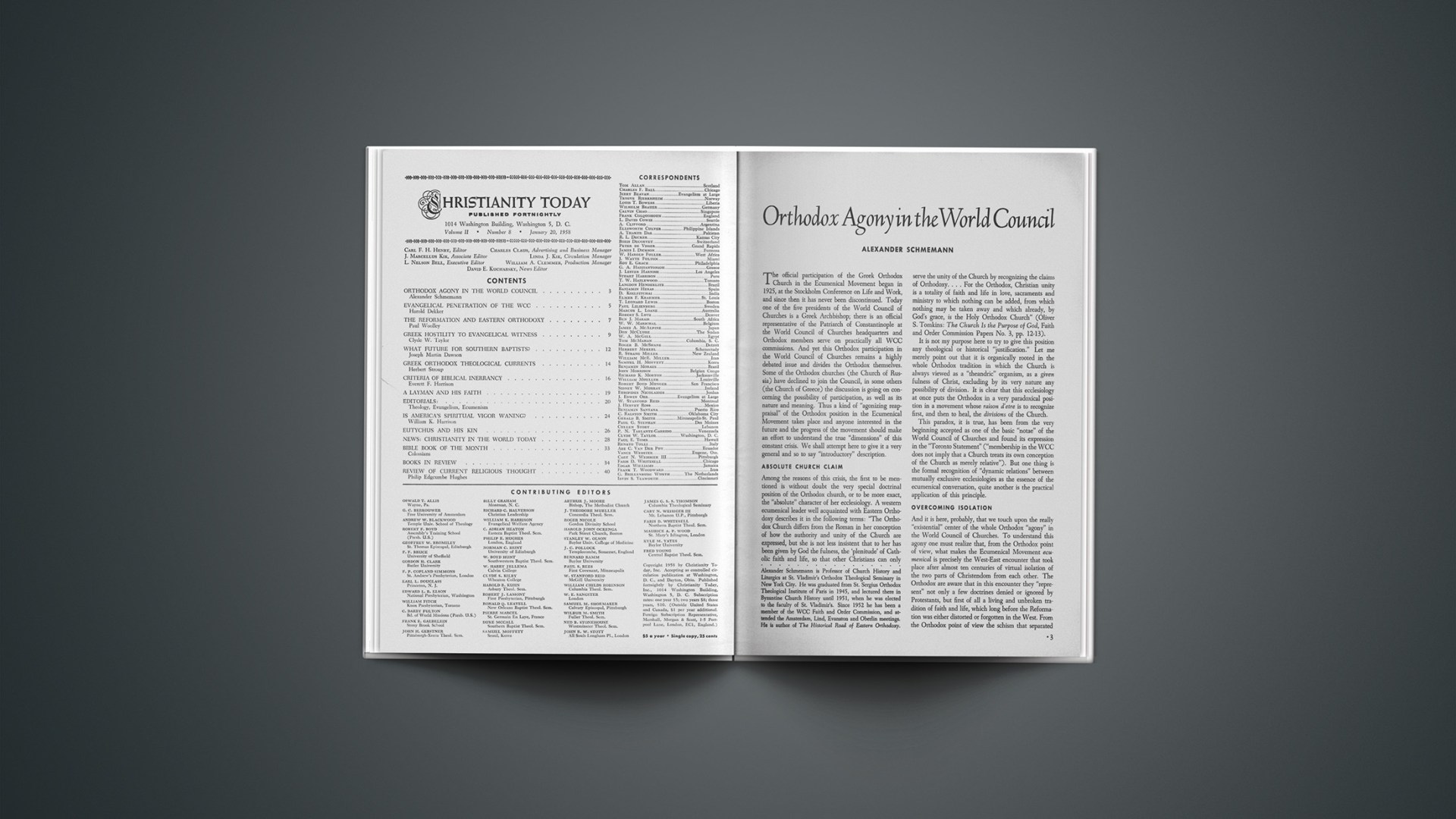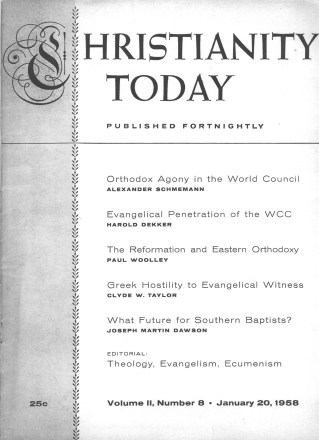The official participation of the Greek Orthodox Church in the Ecumenical Movement began in 1925, at the Stockholm Conference on Life and Work, and since then it has never been discontinued. Today one of the five presidents of the World Council of Churches is a Greek Archbishop; there is an official representative of the Patriarch of Constantinople at the World Council of Churches headquarters and Orthodox members serve on practically all WCC commissions. And yet this Orthodox participation in the World Council of Churches remains a highly debated issue and divides the Orthodox themselves. Some of the Orthodox churches (the Church of Russia) have declined to join the Council, in some others (the Church of Greece) the discussion is going on concerning the possibility of participation, as well as its nature and meaning. Thus a kind of “agonizing reappraisal” of the Orthodox position in the Ecumenical Movement takes place and anyone interested in the future and the progress of the movement should make an effort to understand the true “dimensions” of this constant crisis. We shall attempt here to give it a very general and so to say “introductory” description.
Absolute Church Claim
Among the reasons of this crisis, the first to be mentioned is without doubt the very special doctrinal position of the Orthodox church, or to be more exact, the “absolute” character of her ecclesiology. A western ecumenical leader well acquainted with Eastern Orthodoxy describes it in the following terms: “The Orthodox Church differs from the Roman in her conception of how the authority and unity of the Church are expressed, but she is not less insistent that to her has been given by God the fulness, the ‘plenitude’ of Catholic faith and life, so that other Christians can only serve the unity of the Church by recognizing the claims of Orthodoxy.… For the Orthodox, Christian unity is a totality of faith and life in love, sacraments and ministry to which nothing can be added, from which nothing may be taken away and which already, by God’s grace, is the Holy Orthodox Church” (Oliver S. Tomkins: The Church Is the Purpose of God, Faith and Order Commission Papers No. 3, pp. 12–13).
It is not my purpose here to try to give this position any theological or historical “justification.” Let me merely point out that it is organically rooted in the whole Orthodox tradition in which the Church is always viewed as a “theandric” organism, as a given fulness of Christ, excluding by its very nature any possibility of division. It is clear that this ecclesiology at once puts the Orthodox in a very paradoxical position in a movement whose raison d’etre is to recognize first, and then to heal, the divisions of the Church.
This paradox, it is true, has been from the very beginning accepted as one of the basic “notae” of the World Council of Churches and found its expression in the “Toronto Statement” (“membership in the WCC does not imply that a Church treats its own conception of the Church as merely relative”). But one thing is the formal recognition of “dynamic relations” between mutually exclusive ecclesiologies as the essence of the ecumenical conversation, quite another is the practical application of this principle.
Overcoming Isolation
And it is here, probably, that we touch upon the really “existential” center of the whole Orthodox “agony” in the World Council of Churches. To understand this agony one must realize that, from the Orthodox point of view, what makes the Ecumenical Movement ecumenical is precisely the West-East encounter that took place after almost ten centuries of virtual isolation of the two parts of Christendom from each other. The Orthodox are aware that in this encounter they “represent” not only a few doctrines denied or ignored by Protestants, but first of all a living and unbroken tradition of faith and life, which long before the Reformation was either distorted or forgotten in the West. From the Orthodox point of view the schism that separated Rome and the whole West from the Orthodox church made the Reformation both unavoidable and unavoidably “Western” in its presuppositions and developments, for the real disruption of the “catholic understanding” had taken place long before. The Reformation, in other words, expressed itself in terms of Western theological and ecclesiological tradition, but some of these terms, at least, were the result of a long and tragical distortion. Therefore the uniqueness of the Ecumenical Movement lies precisely in the possibility of going beyond this “Western” tradition, to evaluate it within a restored universal framework of Christian thought and experience. Eastern Orthodoxy, whatever its own historical limitations and shortcomings, was to provide the ecumenical dialogue with those “terms of reference” that were forgotten or denied in the Western spiritual development. In the Orthodox conception, the Christian West, divided as it is, still constitutes a “whole,” in which all “denominations” are related to each other in a fundamental unity of thought-forms and theological categories. And this is especially true of non-Roman Christianity, whether “catholic” or “protestant.” It is this “whole” that Eastern Orthodoxy encounters in the Ecumenical Movement, giving it its “other pole,” so that this opposition constitutes the basic ecumenical tension; without it the Ecumenical Movement ceases to be ecumenical, in the full sense of this expression, and must be understood as a movement towards reunion of churches having their common origin in the Reformation.
Ecumenical Difficulties
If all this is true, and it is true at least in the Orthodox understanding of the ecumenical reality, then, in spite of the formal rectitude of the Toronto Statement, the Orthodox church is still facing very real difficulties in her relations with the World Council of Churches. For the constitution of the World Council of Churches puts on exactly the same level the divisions between the non-Roman churches of the West and the more basic division between the West and Orthodoxy. According to this constitution the Orthodox churches are but some of the one hundred sixty bodies which altogether constitute the World Council. Not only are they a numerical minority, but their whole doctrinal tradition has to be expressed in terms of “agreements” and “disagreements” proper to the West itself, but whose adequacy to the Orthodox faith and experience is more than doubtful. The Orthodox church is forced to witness to her faith in categories and terms which too often are not hers, which are not capable of embodying her real message and essence. She can fully recognize herself neither in the Amsterdam definition of the “catholic,” nor in the various classifications proposed since then. And it is precisely this impossibility to express herself fully and adequately that forces her so often into a position that to so many Protestants seems almost entirely negative and even arrogant. I do not mean that the Orthodox church wants all other Christians to accept her own theological language. No one among the Orthodox will deny the wonderful “ecumenical” achievements such as the common return to the Bible, a common search for theological and spiritual revival, and so forth. But inasmuch as the Ecumenical Movement cannot be reduced to a theological conversation but is a living encounter of living experiences, the Orthodox participants feel that the totality of their experience, of their tradition, cannot be fully expressed in the present ecumenical setup. For once more, in their opinion, the ecumenical dialogue consists not so much in the discussion of precise “agreements” and “disagreements,” but, above all in the recovery of a common language, in restoration of the “catholic mind.”
An Open Question
All this explains why the problem of Orthodox participation in the World Council of Churches is a permanently “open” question, which cannot be solved by a mere election of Orthodox dignitaries to high ecumenical positions. There must begin within the World Council of Churches itself a process of re-evaluation of its whole structure, of transforming it into a more adequate “ecumenical” instrument. But is it not the very nature of the World Council of Churches to be always in a “process of formation,” to be a question and a challenge more than an answer and a solution, to be itself in “agony” as long as Christian unity is not achieved in the fulness of the Church?
We Quote:
Henry Stob
Associate Professor of Ethics, Calvin Seminary
It is characteristic of the Reformers that they put human liberty in an ethico-religious context. This is especially true of Calvin. He binds freedom to morals. Freedom for him is a means and not an end. It has only instrumental value. It must serve the purposes of love. This determines its nature, and sets the limits of its exercise.… Liberty, then, is always in order to goodness. It is never merely freedom from something; it is always freedom to something, the freedom to meet one’s obligations. It always implies direction, which means commitment to some value or ideal. This means that freedom binds. It presupposes God. Our duties are the generating source and limit of our liberties. But our duties represent precisely God’s sovereign claim on us. There can, accordingly, be no liberty that does not take God into account. This is Calvin’s conviction and that of every Christian who listens intently to the Word.—In The Christian Concept of Freedom (Grand Rapids Int’l Publications).
Alexander Schmemann is Professor of Church History and Liturgics at St. Vladimir’s Orthodox Theological Seminary in New York City. He was graduated from St. Sergius Orthodox Theological Institute of Paris in 1945, and lectured there in Byzantine Church History until 1951, when he was elected to the faculty of St. Vladimir’s. Since 1952 he has been a member of the WCC Faith and Order Commission, and attended the Amsterdam, Lind, Evanston and Oberlin meetings. He is author of The Historical Road of Eastern Orthodoxy.










